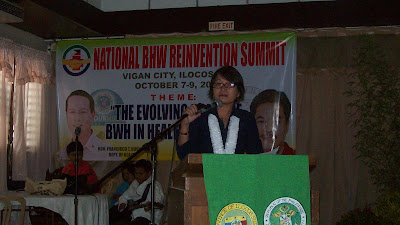 |
| Susanita "Babes" G. Tesiorna is seated 7th from the right. |
ALLWIE/S BUILDING ON THE GAINS OF THE INFORMAL SECTOR COALITION OF THE PHILS (ISP - TUCP) ON THE ELIMINATION OF WORST FORMS OF CHILD LABOUR
In behalf of the workers, Susanita "Babes" G. Tesiorna, the President of the Informal Sector Coalition of the Philippines (ISP-TUCP) welcomed the tripartite delegates to the Asia Region Tripartite Consultation on Guidelines for the Preparation of National Child Labour Policies and Action Plans and on Mainstreaming Child Labour Concerns in Broader Policy Frameworks on Nov. 23-25, 2010, Bangkok, Thailand.
During the two-day workshop, Ms. Tesiorna insisted to go beyond the tripartite constituents to address MDG Goal of "no worst foms of child labour by 2016 by involving the community groups or associations. She pointed that no single institution, organization or indvidual can do it all alone, not even the tripatrite constituents alone. She cited the example of the KALAHI convergence strategy of the Phil. Government where she has been effectively engaged since 1999 in addressing poverty. This idea was supported by fellow Philippine delegates such as Ms. Rhodora Buenaventura of the Employers' Confederation of the Phils. and Ms. Maribeth Casin of the Department of Labour.
Upon return to the Philippines, with the workshop objective to mainstream issues of child labour in the national policies and plans, Ms. Tesiorna advocated to the NAPC-Workers in the Informal Sector Council of 2010-2013 for integration into the Sectoral Agenda. It was approved by the Council in June, 2010.
The following is the text of welcome message in behalf of the workers:
TUCP Statement to the Asia Region Tripartite Consultation on Draft Guides for the Preparation of National Child Labour Policies and Action Plans and on Mainstreaming Child Labour Concerns in Broader Policy Frameworks
23-25 November 2009, Bangkok, Thailand
Sis. Susanita Tesiorna
Informal Sector Coalition of the Philippines (ISP/TUCP)
On behalf of the Workers’ Delegates
On behalf of workers’ delegates from Cambodia, India, Indonesia, Mongolia, Nepal, Pakistan, Sri Lanka, and Thailand, and millions of children still suffered to work, we commend ILO for its continuing efforts to reach out and include trade unions and organizations of workers in this important work.
As we look at the issue of child labor worldwide and in the Region, it is a bad news/good news and numbers story.
The bad news is –
our journey for emancipation of child labor has been all too grueling.
Our good programs, our good/best practices, are stymied, partly thwarted, by crisis after crisis, by disasters after calamities.
The good news is –
Tripartite delegations in this consultation are from countries which have actual experience in the formulation, implementation and monitoring of child labor policies, projects and action plans.
It is particularly good news for other child labor-affected countries in the Region to know that the tripartite sectors, particularly the workers’ sector,
are again part of the process in developing, refining and rationalizing set of guidelines for mainstreaming national child labor policies and action plans.
This initiative would have been impossible five years ago. But countries in this Region have moved past embarrassment, past denial, of the existence of child labor to a consensus of determined action to stopping, eliminating and preventing child labor – particularly its worst forms.
We have come a long way.
In initiatives leading to our countries’ ratification of ILO Conventions 138 and 182, in the passage of national legislations, laws and regulations and the development of national policies and programs, trade unions, working families, coalition and networks have always been at the forefront of the movement
to eradicate worst forms of child labor.
Trade unions have fought the exploitation of children at all fronts — in plantations, factories, informal sector, domestic service, human trafficking.
We have taken this battle to collective bargaining, in tripartite/multipartite discussions.
Our engagement in this area has moved beyond mere advocacy for specific anti-child labor approaches and programs, beyond representation in anti-child labor bodies, beyond design and implementation of joint anti-child labor programs and services
to trade unions’ own programs including prevention, monitoring, alternative employment, livelihood, education and provision of other welfare services.
Despite these, yours and our successes put together, we are barely scratching the surface.
When the number of child laborers is equivalent to the entire population of one big country. And within it, the worst forms, roughly the population of two small countries combined,With more new and highly complicated forms of child exploitation developing everyday,And our gains barely meeting the 2016 targets Then you have 122 million and more reasons to be concerned about.
It is not a question of “who does it better” –the government, employers, workers, or other players –but what the tripartite sectors can do more together Who else needs to be involved? And how can we strengthen our resolve, deliver faster results With little time and shrinking resources.
With intervening global crisis and terrible calamities pushing back hard-fought gains – and decent work for all, for parents of child laborers more distant than ever.
We believe that in anti-child labor initiatives, doing the same thing over and over again and expecting different results is intolerable.
We should stop dreaming or believing that dole-outs and unsustainable foreign- or donor-driven programs are the answer.
These are important, they mitigate hardships, even if mostly temporarily, they show the way to what can be done in child labor prevention and services, and are most welcome,but reducing poverty – of parents of child laborers and of their communities –will be the only lasting, sustainable solution.
Practical, more focused guidelines and activities that reflect, understand and consider local realities and environments of communities, and designed and carried out locally by parents and children themselves, with guidance and assistance from support groups and institutions – are the ones needed. We can’t tell you how important, timely and overdue this instrument is
We believe that eradicating child labor in our time is a daunting challenge.We have come here with the strong support of our members, our families,our partners, our communities. The challenge doesn’t look as daunting as before,when, together, with children and their parents, the tripartite sectors explore how much more we could do and how much more we should be doing.
We – trade unions and people’s organizations – offer our expertise, actual experiences, accomplishments.
Our presence here today signifies our commitment –to guide, act, participate, contribute, and continue to take part, or even lead, in this movement. We will make our voices — and those of our child laborers – heard and heeded.
We promise an exciting meeting.







































